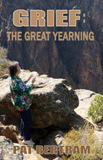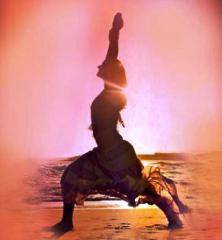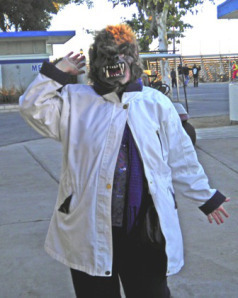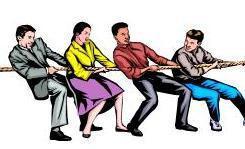Pat Bertram's Blog, page 203
March 23, 2014
Gone Fishing
I’m going to turn off my computer for the next twenty-four hours and take myself on a fishing trip. Not to fish for fish, of course — such a hobby is only peaceful for the one fishing; the poor fish are scared, hurt, and fighting for their life — but to fish for life. See what happens when I am disconnected from my usual online pursuits. Just take off for a day. See what I can see. Feel what I can feel.
If you want to contact me, leave a comment and I’ll get back to you tomorrow. Or whenever.
***
Pat Bertram is the author of the suspense novels Light Bringer, More Deaths Than One, A Spark of Heavenly Fire, and Daughter Am I. Bertram is also the author of Grief: The Great Yearning, “an exquisite book, wrenching to read, and at the same time full of profound truths.” Follow Pat on Google+. Like Pat on Facebook.
Tagged: disconnecting from the internet, fishing for life, gone fishing


March 22, 2014
Excerpt From “Grief: The Great Yearning” — Day 359
 I’ve come a long way in the three years since I wrote the following journal entry. I still don’t understand the point of it all, but the questions don’t haunt me quite as much as they did during the first years after Jeff’s death. I’m learning to live without him, learning even to want to live without him. Sometimes I see his death as freeing us — me — from the horrors of his dying, and I don’t want to waste the sacrifice he made.
I’ve come a long way in the three years since I wrote the following journal entry. I still don’t understand the point of it all, but the questions don’t haunt me quite as much as they did during the first years after Jeff’s death. I’m learning to live without him, learning even to want to live without him. Sometimes I see his death as freeing us — me — from the horrors of his dying, and I don’t want to waste the sacrifice he made.
I no longer feel as if I am squandering time when I am doing trivial things because I have come to realize there are no trivialities. Everything we do is living, taking part in the great panoply of life. Whatever we do adds to the Eternal Everything.
I still yearn to talk to Jeff, of course. I miss talking to him, miss his insights, miss the conversation that began the day we met and continued for decades until he got too sick to hold up his end of the dialogue. I was truly blessed. He never misunderstood what I said. I could make a simple comment to him, and he understood it was a simple comment. He didn’t make a big issue out of it, just answered back appropriately. It seems now every remark I make to anyone becomes a major deal as I try to explain over and over again what I meant by the first remark. It’s exhausting.
I’m grateful we met and had so many years together. Grateful for all the words we spoke to each other. Grateful I once had someone to love. Grateful that when my time comes to die, he won’t be here to see me suffer. Grateful he won’t have to grieve for me or be tormented by unaswerable questions.
Excerpt from Grief: The Great Yearning
Day 359, Dear Jeff,
I never felt as if I were wasting time no matter what you and I did—even something trivial like playing a game or watching a movie — so why do I feel I’m wasting time if I do those things alone? Don’t I have just as much worth now that I’m alone as I did when I was with you?
When I was out walking in the desert yesterday, I talked to you. You didn’t answer, of course, or if you did, I didn’t hear. We talked about meaninglessness. If you still exist somewhere, if you still have being, if life doesn’t end with death, then life has an inherent meaning — whatever I do or think or feel, no matter how trivial, has meaning because it adds to the Eternal Everything. If death brings nothing but oblivion, then there is no intrinsic meaning to life. So a search for meaning is meaningless (except on a practical level. We all need to feel we are doing something meaningful so we can get through our days and even thrive). Life either has meaning or it doesn’t. Meaning isn’t something to find but to be. So, I’m going to search for meaninglessness, or at least accept it.
Such thoughts seem as meaningless and as trivial as the rest of life. They get me knowhere. (I’m leaving that error, because . . . wow! So perfect!)
I’ve been watching your Boston Legal tapes again. Nicely meaningless since they put me to sleep. But they make me feel connected to you because we watched them a year ago during your last days at home.
This first year of your being dead is coming to an end, and I still don’t know how to survive the pain of your being gone, but I am surviving. Not thriving, not yet, but I will. There’s still so much to work through — all those years of your being ill, our unhappiness, our shattered dreams. Despite all the bad, we did have a good life, a fulfilling one. We journeyed together as long as we could, now it’s up to me to continue our journey alone. Will it continue to be “our” journey or will it become mine alone? I know who I was when I was with you. Now I need to find out who I am without you. To find worth in being alone.
Adios, compadre. I love you.
Click here to find out more about Grief: The Great Yearning
***
Pat Bertram is the author of the suspense novels Light Bringer, More Deaths Than One, A Spark of Heavenly Fire, and Daughter Am I. Bertram is also the author of Grief: The Great Yearning, “an exquisite book, wrenching to read, and at the same time full of profound truths.” Connect with Pat on Google+. Like Pat on Facebook.
Tagged: first anniversary of grief, grief and gratitude, grief and searching for meaning, grief journal, Grief: The Great Yearning, letters to the dead


March 21, 2014
A True Woman’s World
We are bound to the world by society, culture, our shared past. We have no real choice as to what world we are born into — we come as babies to a fully formed structure, learn our way around that structure, and then finally, as adults, either try to live within the structure or try to bend that structure to our needs, hopes, dreams.
 I wrote a blog the other day about not believing in women’s issues. The point I tried to make is that both men and women have issues, and that what I believed in were human issues, non-gender issues, such as fairness and respect for everyone. In response, a friend texted me: “You are entitled not to be a feminist. A lot of very brave, determined women won you that right.” Although I commend his willingness to disagree with me since many people don’t want to voice disagreement with my commentaries, his remark hit me wrong. It presupposes that as a woman I have an obligation to be a feminist and that it’s my “right” to choose to forego that obligation.
I wrote a blog the other day about not believing in women’s issues. The point I tried to make is that both men and women have issues, and that what I believed in were human issues, non-gender issues, such as fairness and respect for everyone. In response, a friend texted me: “You are entitled not to be a feminist. A lot of very brave, determined women won you that right.” Although I commend his willingness to disagree with me since many people don’t want to voice disagreement with my commentaries, his remark hit me wrong. It presupposes that as a woman I have an obligation to be a feminist and that it’s my “right” to choose to forego that obligation.
For thirty-four years, I was deeply connected to another human being — a man. Because of this relationship, I understood the unfairnesses of a man’s life as much as I did the unfairnesses of a woman’s life. I want fairness for everyone, so much so that I have often done the fair thing when it was to my detriment simply because it was the fair thing to do.
It seems to me that those who champion women’s issues don’t want fairness. They want the tables turned where it’s women in the forefront of economic and societal structures. And it’s happening. According to a new analysis of 2,000 communities by a market research company, in 147 out of 150 of the biggest cities in the U.S., the median full-time salaries of young women are 8% higher than those of the guys in their peer group. In two cities, Atlanta and Memphis, those women are making about 20% more. This squares with earlier research from Queens College, New York, that had suggested that this was happening in major metropolises. But the new study suggests that the gap is bigger than previously thought, with young women in New York City, Los Angeles and San Diego making 17%, 12% and 15% more than their male peers, respectively. And it also holds true even in reasonably small areas like the Raleigh-Durham region and Charlotte in North Carolina (both 14% more), and Jacksonville, Fla. (6%).
This disparity is seen as an advance in women’s rights, but where’s the fairness? Are we supposed to continue to champion an equality where one gender is more equal than another?
If it is true that I owe those brave, determined feminists a debt, then I owe it to men, too. It was the urban world the early suffragettes were born into that gave them the time to fight for such things as equality. Women (and men) in non-urban areas were too busy keeping alive to worry about jobs outside the home or politics or bodily automony. So in a way, it was the industrial revolution, the legacy of men, that brought about the conditions that ultimately led to the fight for women’s rights. Oddly, it was urbanization in ancient times that originally contributed to the loss of women’s power, women’s religions, women goddesses. So there is no one to thank, no one to blame, no one to be indebted to for my “right” not to be a feminist — I was simply born into a particular world, the sum of everything that has gone before.
Besides, I believe feminists are settling for too little. Instead of demanding entry into the so-called “men’s world,” I always thought women should create their own world, not the housewifey world that is usually considered a woman’s world though is merely an adjunct to the man’s world, but a true woman’s world — the world of mysteries, wildness, goddessness that is our birthright. A world superior to the world that we were born into.
But perhaps the structures of this materialistic world are too well entrenched, and all we can do is change who controls the materials.
***
Pat Bertram is the author of the suspense novels Light Bringer, More Deaths Than One, A Spark of Heavenly Fire, and Daughter Am I. Bertram is also the author of Grief: The Great Yearning, “an exquisite book, wrenching to read, and at the same time full of profound truths.” Follow Pat on Google+. Like Pat on Facebook.
Tagged: a woman's life, a woman's world, fairness for everyone, feminism, men's issues, women's issues


March 20, 2014
Embracing My Wild Divinity
When I tell people I want to lead a wild life, to find the wild woman within, some women instinctively understand what I mean, while other folks just give me a blank stare. During my school days, the wild kids were those who smoked and drank, played loud music, partied, gave little consideration to rules or consequences. As young adults, the wild ones were … well, they were pretty much like the wild kids. Smoking and drinking, playing loud music, partying, giving little consideration to rules or consequences, sometimes riding motorcycles, hanging around bars, picking up mates for a night.
I have a hunch that when I tell the blank-stared folks of my desire for wildness, such images come to their minds, but the truth is, I have no interest in that particular kind of tameness. I call it tameness because although it seemed wild to us at the time, the activities were all part of the rebelliousness of youth, a reaction to the strictures of our lives, and, while not perfectly acceptable, perhaps, they were an adjunct to the urbanization and corporatizing of our tame world.
 To tell the truth, I’m not exactly sure what I mean by “wild woman.” I tried to do a bit of research into the mythology of wild women and kept bumping into the book Women Who Run With Wolves. My first reaction, of course, was to get the book, but then I changed my mind. I don’t want to know what other people mean by wildness. I want to find out what I mean. I do know that being a wild woman isn’t about getting into trouble or dangerous situations, it’s about embracing my connection to life, being the person I was meant to be without the structure of societal conventions or the bonds other people’s expectations. It’s about finding the things that call to me from the soul rather than what beckons me from without. It’s about extending my reach, to want what up to now has escaped me. It’s about finding what feeds the hungry beast inside me. It’s about striking out on my own, trusting my instincts yet relying on experience. It’s about the having the courage and boldness to go where I must. It’s about living a natural life, following my own rhythms, being true to myself.
To tell the truth, I’m not exactly sure what I mean by “wild woman.” I tried to do a bit of research into the mythology of wild women and kept bumping into the book Women Who Run With Wolves. My first reaction, of course, was to get the book, but then I changed my mind. I don’t want to know what other people mean by wildness. I want to find out what I mean. I do know that being a wild woman isn’t about getting into trouble or dangerous situations, it’s about embracing my connection to life, being the person I was meant to be without the structure of societal conventions or the bonds other people’s expectations. It’s about finding the things that call to me from the soul rather than what beckons me from without. It’s about extending my reach, to want what up to now has escaped me. It’s about finding what feeds the hungry beast inside me. It’s about striking out on my own, trusting my instincts yet relying on experience. It’s about the having the courage and boldness to go where I must. It’s about living a natural life, following my own rhythms, being true to myself.
I’ve always been fascinated by the wild places of the world. The places deep within the Amazon that have never been touched by the modern world. The depths of the oceans that lie beyond our instruments. Deep caverns that have never been explored. I don’t suppose there are any of those places left except in my imagination, but still, I am caught by the lure of what might lie beyond our modern society and culture, what might exist beyond man-made (and woman-made) laws and conventions. Of course, any such cultures would have their own conventions that bind their members, so perhaps even the figments of my imaginings are tame in their own way.
And yet, and yet . . .
I wonder what wild places lie in my heart, my mind, my soul. What passions might I feel that I have not yet discovered? What ideas could I have that would spring forth as if from the earth itself? What unheard songs does the universe sing to me?
That is where I will find my wildness, not in bars, in a bottle, or dangling from a bungee cord.
Blessings from John O’Donohue:
“May the angel of wildness disturb the places where your life is domesticated and safe, take you to the territories of true otherness where all that is awkward in you can fall into its own rhythm.”
and
“May the beauty of your life become more visible to you, that you may glimpse your wild divinity.”
***
Pat Bertram is the author of the suspense novels Light Bringer, More Deaths Than One, A Spark of Heavenly Fire, and Daughter Am I. Bertram is also the author of Grief: The Great Yearning, “an exquisite book, wrenching to read, and at the same time full of profound truths.” Follow Pat on Google+. Like Pat on Facebook.
Tagged: a wild woman, becoming untame, Blessing, feral emotions, John O'Donohue, wild divinity, wild side


March 19, 2014
Email Absurdities
Sometimes life online gets a bit too absurd for me. Once a long time ago, I had a fellow author I met on Facebook as a guest on my blog. Back then, I was less concerned with giving out my email address, and besides, at that time, you couldn’t include attachments in FB messages, so I really had no choice.
 Every once in a while I’d get a promo message from him, but those emails were sporadic, so they simply got swallowed up in the great maw of Yahoo mail. More recently, I got a couple of mass emailings asking for support for his indigogo campaign. He is still a long way from his goal, and so needs the help of his “friends” to help fund his project.
Every once in a while I’d get a promo message from him, but those emails were sporadic, so they simply got swallowed up in the great maw of Yahoo mail. More recently, I got a couple of mass emailings asking for support for his indigogo campaign. He is still a long way from his goal, and so needs the help of his “friends” to help fund his project.
After the first email, I sent him a message asking him to remove me from his mailing list. Just a pleasant non-confrontational request. (I despise group emails unless I am actually part of a group, and even then, I don’t particularly like them though I have to tolerate them.) Today, I got another email from him again asking for support.
I messaged him back: I have asked you to please remove me from your mailing list. A favor I did once a long time ago — having you as a guest on my blog — should not be punished by unwanted emails. Please remove me from your mailing list. I admit this wasn’t the kindest of messages, but since I am connected to thousands of authors all over the internet, the deluge of promos gets to be a bit much.
He responded: Just to let you know, I removed you from my contact list so you will never receive any emails from me again. Breathe easy. The punishment for your kindness is over. Thanks and good luck.
Me: Thank you
Him: You’re welcome. Please stop emailing me. I no longer want to hear from you. Ever.
I didn’t respond, of course, but a little later I got another message from him: I’m very sorry that I’ve upset you. It will never happen again. Ever. You will never hear from me again. Ever.
Then, fifteen minutes later, I got yet another message: Thanks for your understanding that I’m only human and have made a mistake. It will never happen again. Ever. Good luck.
Ah! The joys of the internet age.
***
Pat Bertram is the author of the suspense novels Light Bringer, More Deaths Than One, A Spark of Heavenly Fire, and Daughter Am I. Bertram is also the author of Grief: The Great Yearning, “an exquisite book, wrenching to read, and at the same time full of profound truths.” Follow Pat on Google+. Like Pat on Facebook.
Tagged: asking to remove yourself from a mailing list, mass emailings, unwanted emails


March 18, 2014
Escaping the Cage
I have always been a highly civilized person. For the most part, I am considerate of others. I am never intentionally rude or bad mannered or insulting. I am not uncouth. I don’t make scenes in public (or private, for that matter). I seldom raise my voice. I listen more than I talk. I dress modestly. I use correct English and am not given to crudeties or foul language. If it’s in my power and nature, I almost always do what others ask. I try to be helpful. In other words, I am tame.
Whe n I was young, a lot of this tameness came from being fearful of doing the wrong thing. I grew up in a shifting emotional atmosphere where from one minute to the next, I didn’t know how I would be treated, so I did the only thing I could — be a good girl. I obeyed. I never talked back. I keep my rebellious thoughts to myself. I did what was expected of me, often before such expectations were even expressed.
n I was young, a lot of this tameness came from being fearful of doing the wrong thing. I grew up in a shifting emotional atmosphere where from one minute to the next, I didn’t know how I would be treated, so I did the only thing I could — be a good girl. I obeyed. I never talked back. I keep my rebellious thoughts to myself. I did what was expected of me, often before such expectations were even expressed.
As an adult, I continued to be tame. I seemed to know instinctively that any fierce disagreement would only lead to fiercer disagreements, escalating until one of the parties killed the other. Of course, such hostilities generally don’t end in death because somewhere along the line, one of the combatants gives in. Since I knew that in any conflict I would be the one to give in, I never took up the battle in the first place. If I were going to give in, I figured I might as well do so before any damage was done.
I’m still tame, of course. By now it’s not just a habit, it’s who I am. Kind. Conciliatory. Even-tempered. I do experience anger once in a very great while, but those infrequent outbursts flare up quickly and die just as quickly.
Still . . .
There is a untamed side to me — an inner savage, a wild woman, a primitive and elemental being — that I get glimpses of once in a while. I first noticed this untameness when grief descended on me with the all the power of Thor’s hammer. I had no idea I was capable of such feral emotions. Even if I had wanted to, I could not have controlled my grief as I had always controlled my emotions. Grief came in an instant then grew and grew until there was so much pain I wanted to scream. And so I did. Mild-mannered me, tame me, good girl me screamed my agony to the winds.
For the past four years, ever since the death of my life mate/soul mate, I’ve been feeling an itch for “more.” I have never known what this undefined “more” is, but I’m getting an inkling that it is my wild side. I’m not sure how to unleash the wildness, though. Perhaps just by being aware of my connection to the earth. Perhaps by letting the winds take me where they wish. Perhaps by being spontaneous.
As John O’Donohue wrote in Aman Cara, “To be spontaneous is to escape the cage of the ego by trusting that which is beyond the self.”
To escape the cage. To be wild.
Oh, yes.
***
Pat Bertram is the author of the suspense novels Light Bringer, More Deaths Than One, A Spark of Heavenly Fire, and Daughter Am I. Bertram is also the author of Grief: The Great Yearning, “an exquisite book, wrenching to read, and at the same time full of profound truths.” Follow Pat on Google+. Like Pat on Facebook.
Tagged: a wild woman, becoming untame, civilized person, feral emotions, inner savage, wild side


March 17, 2014
I Don’t Believe in Women’s Issues
I made a comment to a friend today about a writer with an over-inflated sense of his talents, and the friend responded, “Did you know he’s a champion of women’s issues?” That made me stop to think. I came to three conclusions: first, women’s issues don’t have much if anything to do with good writing; second, I don’t know what women’s issues are, and third, whatever they are, I don’t believe in them. I don’t even know what plain non-gender-specific “issues” are, so I’ve spent the last hours researching issues and women’s issues, starting with “issue.” “Issue”  means 1) an important topic or problem for debate or discussion and 2) personal problems or difficulties.
means 1) an important topic or problem for debate or discussion and 2) personal problems or difficulties.
Whatever my personal problems or difficulties, I don’t consider them “women’s” issues. They are my issues, and I don’t primarily define myself by gender. Frankly, I don’t define myself at all. For a while, after the death of my life mate/soul mate, I defined myself by his absence since his goneness was so much a part of my very being, but now that the void isn’t as apparent, I’m just me again — a work in progress, a being in flux.
As for women’s issues — the right to bodily integrity and autonomy, to vote, to hold public office, to work, to fair wages or equal pay, to own property to education, to serve in the military or be conscripted, to enter into legal contracts, to have marital or parental rights, and whatever else is on the agenda — they seem more a matter of politics, and I am not a political creature. To be honest, I don’t believe in such things as conscription for anyone, and I’d just as soon we all got along so we could get along without any sort of military. I don’t believe in contracts, either. Since contracts can be broken, can be entered into with bad faith, can be ignored, they are only as good as the lawyer you hire, and . . . well, I don’t believe in lawyers, either. (Do you see a pattern here?)
The issues I believe in are fairness, freedom, truth, love, kindness, respect, purpose, generosity of spirit. Any so-called women’s issue falls into one of these areas of belief. Equal pay is a matter of fairness. No rape is a matter of freedom, respect, and kindness. Pregnancy/abortion is a matter of freedom, sometimes love, often purpose or fairness. Equal responsibilities for both partners in a domestic situation is a matter of fairness, love, kindness, respect.
Men’s issues are also incorporated into the issues I believe in, especially fairness. Yes, men have “issues.” Although most of the high paying jobs are held by men (at least that’s what is said) some men have a hard time getting any sort of work at all. Sometimes men get passed over because of women’s issue politics — if experience and expertise are equal, the job often goes to a woman for no other reason than she’s a woman. Men are discriminated on the basis of height. Tall men (and women) have the advantage when it comes to high paying jobs because height connotes power. We want leaders we can look up to, not down on. Although height is something we have no control over, short people are sometimes seen as weaker unless they have something else going for them — money, aggressiveness, a resounding voice. Men also have more problems with homelessness, violence, workplace deaths than women do, and almost as many problems with domestic abuse and depression.
In a perfect world, everyone’s “issues” would be addressed. And this could be a perfect world. We all — men and women alike — have the capacity for fairness, freedom, truth, love, kindness, respect, purpose, generosity of spirit.
Maybe I should start with myself and refrain from making ungenerous comments about other writers’ abilities.
***
Pat Bertram is the author of the suspense novels Light Bringer, More Deaths Than One, A Spark of Heavenly Fire, and Daughter Am I. Bertram is also the author of Grief: The Great Yearning, “an exquisite book, wrenching to read, and at the same time full of profound truths.” Follow Pat on Google+. Like Pat on Facebook.
Tagged: men's issues, my issues, non gender specific issues, what I believe in, women's issues, women's issues as political issues


March 16, 2014
Life Is An Epic Adventure
Recently I’ve been thinking and blogging about my need for an adventure, such as walking up the Pacific coast, thru-hiking a national trail, or visiting all the national parks. Something life changing. Something truly epic.
I’ve never been a particularly adventuresome sort, but the waning of grief over the death of mate/soul mate has left me with a vast restlessness and a desire for expanding my boundaries, both personally and geographically. From the  beginning (the beginning of my grief, that is), I’ve been determined not to waste his death, and somehow settling down somewhere and living a tame life seems a waste. I want to explore the wild woman within, find out what she is capable of, live a bolder life than I’ve always lived. (Well, bolder within certain parameters. I certainly have no interest in bold pursuits such as skydiving or jet skiing. Walking, one foot always solidly on the ground, is more my style.)
beginning (the beginning of my grief, that is), I’ve been determined not to waste his death, and somehow settling down somewhere and living a tame life seems a waste. I want to explore the wild woman within, find out what she is capable of, live a bolder life than I’ve always lived. (Well, bolder within certain parameters. I certainly have no interest in bold pursuits such as skydiving or jet skiing. Walking, one foot always solidly on the ground, is more my style.)
I don’t know if I will ever be able to follow the call of adventure — responsibilities and physical capabilities could be a deterrent. But the truth is, life itself is an adventure of epic proportions. From the moment we are born, we grow and learn, always trying to expand our reach. We love and hate, laugh and cry, connect with others and disconnect, dance, tell stories, wish upon a star, dream of things that never were. Some people have families and children that bring them sorrow and joy. Some people have wonderful careers that sustain them. Some people have otherworldly experiences that that comfort, challenge, terrify. Some people are lucky enough to fall deeply in love, and sometimes those same people fall deeply into grief. Such epic experiences!
Although I dream of a separate epic adventure within the adventure of life itself, I do try to see the epicness of each day and experience whatever life brings me. Sometimes I find myself in the mountains, in the desert, or by the coast. Sometimes I find myself offering support or accepting comfort. Sometimes I find myself at lunch with friends — and what a privilege that is! It’s amazing how the turns of life often bring people from all over the world to a single place for a while and then with another turn, disperses them.
I suppose even sitting here writing this is an epic adventure. The internet, which burst into life a mere 25 years ago, connects people in a way that even the vicissitudes of life haven’t managed. Break Time, the steampunk the anthology I’m putting together with authors from New Zealand, Australia, Canada, USA, could only be the product of the internet with all of us coming together (without ever meeting) for such a fascinating project.
Still, even though writing might satisfy some folks’ idea of adventure, right now the sun beckons me. I think I’ll go out for a walk and experience the epicness of life first hand.
***
Pat Bertram is the author of the suspense novels Light Bringer, More Deaths Than One, A Spark of Heavenly Fire, and Daughter Am I. Bertram is also the author of Grief: The Great Yearning, “an exquisite book, wrenching to read, and at the same time full of profound truths.” Follow Pat on Google+. Like Pat on Facebook.
Tagged: epic adventrue, grief and the need for adventure, life as an adventure, the call of adventure


March 15, 2014
Patterns of Grief
I’d like to clarify what yesterday’s post, Challenges of the Fourth Year of Grief, was all about. I did not mean to imply that everyone’s grief is the same, that we all face the same challenges, and I especially did not mean to imply that these “challenges” are stages people are going through or will go through. I am not a therapist or a grief counselor, so of course I don’t know how a wide range of grievers feel. Nor am I dispensing advice. I do have many friends who are pretty much on the same grief track that I am, however, and all I did was express publicly the things we are talking about privately.
I certainly am not trying to undermine the grief community’s efforts to get rid of the whole “Stages of Grief” mindset.  I have railed against the stages of grief from the beginning. Kubler-Ross’s supposed stages of grief do not in any way reflect what my friends and I have gone through and continue to go through, which is why I started writing about grief in the first place — to provide a more realistic view of grief, even if it is just a recounting of my own grief experiences.
I have railed against the stages of grief from the beginning. Kubler-Ross’s supposed stages of grief do not in any way reflect what my friends and I have gone through and continue to go through, which is why I started writing about grief in the first place — to provide a more realistic view of grief, even if it is just a recounting of my own grief experiences.
Even though everyone’s grief is different, there are still patterns of similarity.
For example, most of us (most of my friends, that is, not most grievers) are being swept by an inordinate need for adventure. This need seems to be a reflection of our birth age as well as our grief age (by grief age I mean how long it’s been since our mates have died). Younger woman still have families to care for, and in older women the need for adventure seems muted (though several have admitted to being more adventuresome then when they were married). Maybe it’s the long, empty, years that stretch before me and my friends that make adventure a necessity. Maybe it’s that grief is so epic that only an epic adventure can make us come alive. I truly don’t know where this need for adventure comes from, but the truth is, most of the women I know who are on the same grief track as I am, desperately crave adventure. Again, I don’t mean to imply that all grievers go through this, but it is a pattern, and more than anything else, I am drawn to patterns.
Which is all I was doing by describing some of the little known challenges of grief — showing a pattern.
And one of the patterns I found is that during the fourth year, most of the people I know did make the big disconnect from their mates, realizing in the depth of their being that we are each on our own path, and that whatever we do or do not do cannot affect the deceased. We only have to deal with ourselves. This understanding is why so many women wake up on the fourth anniversary to find a renewed interest in life. Maybe find they are happy. Maybe find they are in love with life again. For some people, of course, this understanding comes much later, occasionally earlier, and sometimes not at all.
The truth is, no matter what the pattern of grief, your own or someone else’s, grief is hard work. Sometimes it’s nice to know how others feel. It’s especially nice to know that we aren’t alone in how we feel.
***
Pat Bertram is the author of the suspense novels Light Bringer, More Deaths Than One, A Spark of Heavenly Fire, and Daughter Am I. Bertram is also the author of Grief: The Great Yearning, “an exquisite book, wrenching to read, and at the same time full of profound truths.” Follow Pat on Google+. Like Pat on Facebook.
Tagged: challenges of the fourth year of grief, grief and need for adventure, Kubler-ross, patterns of grief, stages of grief


March 14, 2014
Challenges of the Fourth Year of Grief
The challenges we face during the first year after the death of a life mate/soul mate (or any other significant person in our lives who connects us to the world), are too great to enumerate. It’s all we can do to cope with the seemingly endless chores of laying our beloved to rest while dealing with the emotional shock, the physical pain, the psychological affront that are our constant companions. Sometimes the first anniversary of his death is one of peace when we realize that we managed to survive the worst year of our life, but then we wake up to the second year and find a whole other set of challenges to meet.
The five main challenges we face during the second year after the death of a life mate/soul mate are:
1. Trying to understand where he went.
2. Living without him
3. Dealing with continued grief bursts.
4. Finding something to look forward to rather than simply existing.
5. Handling the yearning.
 There are other challenges, of course, some unique to each individual, but all the challenges are dealt with the same way: by continuing to feel the pain when it erupts rather than turning away from it to satisfy the concerns of those who don’t understand; by taking care of ourselves even when we don’t see the point; by trying new things.
There are other challenges, of course, some unique to each individual, but all the challenges are dealt with the same way: by continuing to feel the pain when it erupts rather than turning away from it to satisfy the concerns of those who don’t understand; by taking care of ourselves even when we don’t see the point; by trying new things.
In other words, we meet the challenges of the second year by living. It sounds simple, but nothing about grief for a life mate/soul mate is simple. By living, we begin to move away from our pain, but we also move away from the person we loved more than any other. For some bereft, this feels like a betrayal of their love — how can you continue to live when life on this earth is denied him? For others, it seems like a betrayal of themselves — how can you become the person you need to be without betraying the person you once were?
The third year of grief seems to be a year of transition with only one new challenge — beginning to rebuild our lives. (We still have upsurges of sadness, still miss our loved one, still yearn for him, but these feelings are not as prominent as they once were.) Most of us no longer feel that continued life is a betrayal of our love because we understand that we had no choice in the matter, either in his death or in our continued life. Nor do we feel we are betraying the person we once were — we are no longer that person, though we have not yet developed into the person we are to become. Most of us are still trying to figure out who that person is and what that person wants and needs.
You’d think by the fourth year there would be no challenges of grief left, but for most of us, this is the year where we make the necessary disconnect from our loved ones, and that is big though necessary step. No matter how close we were to our mates, no matter how much we felt as if we were two parts to a whole, we realize that in terms of life on this earth, we were two separate beings on two separate journeys. The questions that haunted us, such as the big question of who got the worst end of the deal, seem muted. Our mates had to deal with death and dying, and we had to deal with grief and living. It all seems the same now — life and death — though perhaps it’s more that we’re used to them being gone than that we made any great leap of understanding. We also don’t feel their absence the way we once did. The clawing yearning to see our mates once more has by now muted to a gentler feeling of intermittent melancholy.
Although my fifth year of grief doesn’t start for another two weeks, I am getting an inkling that this is going to be the main challenge of the coming year — dealing with grief’s absence. Grief was a part of our life for a very long time and the immensity of the loss and the enormity of the pain gave our lives a feeling of epic importance, as if we were standing on the very edge of eternity. Well, eternity has retreated, and we are left with the ordinariness of life, and that ordinariness seems . . . well, it seems ordinary. Still, the lessons of grief taught us well, and so we will continue to take each day as it comes. Continue to find something to look forward to rather than simply existing. Continue to look for something to be passionate about, even if it’s just life itself.
***
Pat Bertram is the author of the suspense novels Light Bringer, More Deaths Than One, A Spark of Heavenly Fire, and Daughter Am I. Bertram is also the author of Grief: The Great Yearning, “an exquisite book, wrenching to read, and at the same time full of profound truths.” Follow Pat on Google+. Like Pat on Facebook.
Tagged: challenges of grief, challenges of the fourth year of grief, fifth year of grief, grief and loss, grief at four years






